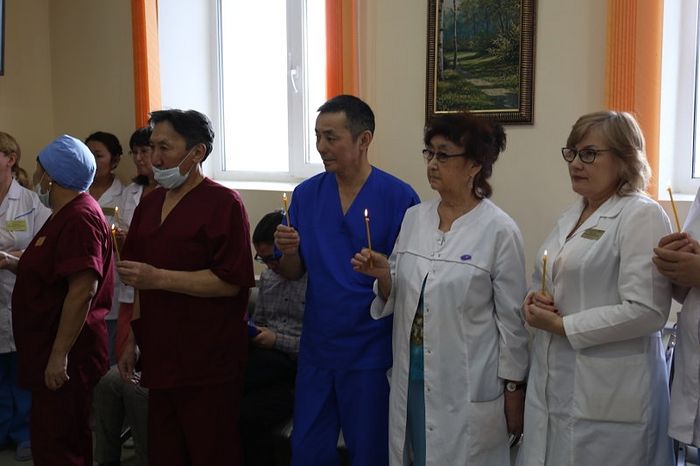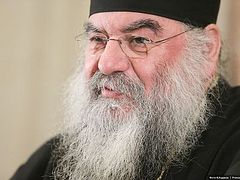In the Gospel the Lord speaks of the insensitive Jews that The queen of the south shall rise up in the judgment with this generation, and shall condemn it: for she came from the uttermost parts of the earth to hear the wisdom of Solomon (Mt. 12:42). The “queen of the south” is a soul that doesn’t know the true faith and tradition but at the same time hopes and desires to touch the truth. Sometimes I think that some adherents of other faiths will “rise up in the judgment with” us, negligent Christians, as they have showed more sensitivity to and reverence for the beauty and holiness of the Orthodox faith than we have.
***
On Thursday of the first week of Lent I heard confessions of and gave Communion to four old women at a hospital. They had prepared for the sacraments and read their prayers the previous evening, so in the morning before breakfast we all gathered in the same ward. We talked about Christian life and prayed a little and then I began to perform the sacraments. The medical staff were understanding, and the hospital nurses, who from time to time popped in with medicines, bed linen and plates, oohed and made away, though I was their “guest” and not vice versa. I even worried a little. So our old ladies confessed, received Communion and were shining with joy. I said good-bye to them and was going to leave, when Volodya [a diminutive form of the Russian name Vladimir], my longstanding hospital assistant and a local staff electrician, came up to me and asked me to go to our chapel to solve one current problem.
That chapel (or prayer-room), that the administration kindly gave us a couple of years ago, was on the same floor. Volodya placed a couch, a table there, I brought icons and a candlestick, we hung a shelf on the wall and put many Orthodox books on it. Now we gather there occasionally to perform a supplicatory prayer service for the sick or a litya for the departed. Both the hospital patients (who can walk or move in wheelchairs) and medical staff come to pray at these services. Since the first prayer service that we celebrated at the hospital of Pochtovoye [a large village of the Bakhchysarai district of the Crimea] was on the feast-day of the Venerable Sergius of Radonezh, we decided to have our chapel consecrated in honor of this great saint of God.
Thus, Volodya led me up to the door of our chapel to show me the crucifix that he had installed on the door and to ask me a question: whether we should write “the chapel” or “the prayer-room” on the plate and whether the dedication to St. Sergius should be mentioned. When we were going along the corridor, we saw an aged stooped man with a stick, dressed in simple home clothes, who looked like a patient. I greeted him with a nod because he had looked at me so kindly that I couldn’t help but greet him. And he greeted me in return with a slight reverent bow, though we had never met before.
While Volodya and I were speaking about the plate inscription, the old gentleman drew nearer and stopped to one side, obviously wishing to ask for something. And as soon as we stopped talking with Volodya, he addressed me:
“Batiushka, I am a Muslim… But I had friends… Good, true friends. And all of them were Christians. But they sadly died… So I wanted to ask your permission to pray for them… May I light a candle for their repose at the church?... You see, I hardly ever leave my house now. And whenever I ask my neighbors, nominal Christians, to pray for them and remember them at church, they refuse and say that they are not church-goers… So there is nobody else to pray for my friends properly at church.”
And I thought: these people were baptized and, therefore, one could pray for their repose at church; and if there was nobody to pray for them except for one Muslim to whom it was so important, then why not? And I answered him that he might come into the church and light candles for the repose of his departed friends.
“Really? I am so happy to hear that!” the old man exclaimed. It was clear that my answer was very important to him. He cherished this opportunity to remember his deceased friends at church—that is, “properly”, “in a correct way”.
At that moment an idea occurred to me and I offered:
“Let me write down your friends’ names in a list. And I will pray for them too. Are you sure that they are Orthodox?”
“Absolutely, father! They were Orthodox!”
We came up to a small table in the lobby, and I wrote down the names of the departed persons to pray for: Anatoly, Vasily, Michael and Vladimir.
The old man was so touched and couldn’t stop thanking me. Though I wanted to talk to him, I had to hurry and do other things. And in general only a conceited and vainglorious person would think that he can make someone change his mind and worldview so soon; sometimes it is wiser and more useful to be silent for a while… I suggested meeting again, but the gentleman replied:
“No, batiushka. Thank you for everything. I will be discharged from hospital today. May the Almighty bless you!”
“And what is your name?” I asked him before we parted.
“Uzer,” he answered.
Thus we parted, inexplicably having become closer together within a few minutes, united by the shared memory of our departed brothers in Christ…
I was walking and praying for that Tatar, imploring God to bring him to the true faith. And, amazed by his spiritual generosity and sensitivity, I was upset and distressed about many of my fellow-Russians’ indifference towards their own faith.
And at that moment I recalled another story, similar to the above, that happened a year ago. I had even written it down, but left in my “rough draft notebook” until it became more relevant.
Last winter some people called me and, as usual, asked me to come and perform a funeral service over the servant of God Victor, a baptized aged man who had died after a protracted illness. So we agreed upon meeting by the village church. But I live in Simferopol and it is a long way from there to the village. And we had a severe, snowy winter that year, which was unusual for the Crimea. So I couldn’t even drive out of my yard: the car went into a skid and I wasted a lot of time. In the end I was late for the bus, and called the people to apologize and agree on a different time. In short, I got to the station on foot, took a bus to the village in question where I was being waited for.
As I was getting into the car, I realized that it was a young Tatar that had come to pick me up. His name was Ahmet.
“We never hurry as a matter of principle. So, please, don’t worry. But, is it true that according to your tradition you need to bury a dead person before sunset?” he asked.
The Tatar alerted me with his question and I said, “No, we don’t have such rules.”
And I added with caution just to make sure:
“Victor was Orthodox, wasn’t he?”
“Yes, he was. He was a very good and kind-hearted man. He was a father figure to me. Why do you think I am arranging all this? Why have I called you and asked you to perform a funeral service over Victor? Because on his deathbed he himself asked me to arrange this… And I want to organize everything properly so that his soul might find rest and peace there.”
“Didn’t he have any relatives?”
“Of course, he had relatives! A wife and a daughter. He also had a son, but the latter died about six years ago.”
“Are his wife and daughter Russian?”
“Yes, they are.”
“But why are they not concerned with arranging for a funeral service to be performed for him?”
“I don’t know. Frankly, I didn’t ask them. Victor asked me personally before his death. That is why I want to take all the arrangements on myself. I was the only man in his immediate surroundings,” Ahmet answered, shrugging his shoulders.
Wondrous are Thy works, O Lord! (Ps. 103:2),” I thought.
We finally arrived at our destination. And what I saw there was a familiar sight: a village street, a wide opened gate with several cars standing by it, and a group of men were standing outdoors, smoking and talking… By the by, this “format” has always surprised me by its lack of good sense and constancy. If your relative or good acquaintance has died, why not come into the house, pray a little, cry out to God from your heart, make a sign of the cross at least?… Instead, the village men prefer crowding in the yard, talking and staying outside. They will yield to no persuasion and won’t come inside. That’s how it goes, and you can do nothing against this silly custom. Truly the Russian soul is mysterious…
I entered the house. There was a coffin with the deceased’s body in it in the middle of the room with a few old ladies around it… And one man stood out against that background, namely a devout and good-humored old Tatar! It was his native Tatar accent, coupled with his casual “spiritual” exclamations in his native tongue, that distinguished him. From time to time he began to speak to those present with open heart and in a very kind and simple manner. It was clear that he was a good and warm-hearted person. And he talked exactly as much as was proper. So he definitely was not a local joker or twaddler, but, rather, a sincere and friendly man.
As I was preparing for the funeral service, the old Tatar was not going to leave. On the contrary, he wanted to seriously and attentively participate in the service. And it was this seriousness and concentration that made him stand out against the general atmosphere of absent-mindedness and despondency. This contrast indeed instantly caught my eye…
I finished the necessary preparations and delivered a short address. I said that all of us Christians trust in the mercy of God, that after death we don’t cease to exist but enter the spiritual world where we are to meet with God and give Him our personal account of our bodily lives. The old Tatar was listening very attentively. At the end of my sermon he uttered “Amen!” and added:
“Thank you! You are a good man… Thank you from the bottom of my heart. Your words were so fine!”
I was surprised to hear that because I had been speaking about things familiar to all Christians. It appears that those simple words obviously touched the old Tatar’s heart more than anyone else’s in the house.
Next I asked everybody to pray for the forgiveness of sins and the salvation of the newly-departed Victor. I said: “I will be praying in the words of Church prayers, and you, please, pray in your own words, putting your hearts into it.” And I started the funeral service.
And this old man (who most probably did not understand the Orthodox funeral rite, the Church ethics, the code of conduct in the presence of a priest, but with all his heart wished to partake in “the work of God”) was standing throughout the service and at some points repeated loudly, “Amen!” and even gave exclamations in Tatar. And, most importantly, he was doing it consciously, listening and responding to the message of all that was said or sung by me… So I myself had to listen more attentively to the hymns and prayers I was reading.
And after I had read the prayer of Absolution, during the last litany this old man was moved so deeply that, repeating “Amen!” and mumbling something else in Tatar, he suddenly burst into tears. It was clear that he was weeping out of his love for the deceased, out of the tender feeling, and maybe out of something else that he did not fully understand. Yet his tears were not those of sentimental people; he was weeping in a particular way, restrainedly and with all his heart… More than that, I was touched by his tears and they really made me feel respect, sympathy, and affection for his friend who I had never met.
This is the end of the story. We can hardly add anything to it. But what we can do is marvel that sometimes adherents of other religions can show sensitivity to and reverence for our faith, unlike many of our baptized Slavic brothers and sisters. It seems that through these people the Lord wants to “open our eyes” and calls on us to repent and reform. He reminds us that until we become more human, until we become more sensitive and devoted to our faith and spiritual life our “talking about faith” will remain mere “empty words”…
Lord, bring us all to the knowledge of the Truth! Both those who have not been born in spirit through Holy Baptism, and those who were born in spirit but are alienating themselves from life eternal through indifference and carelessness. Thou Who alone knowest what is best for us, save us! O Lord! I so much want everyone to know the joy of communion with Thee in eternity.








